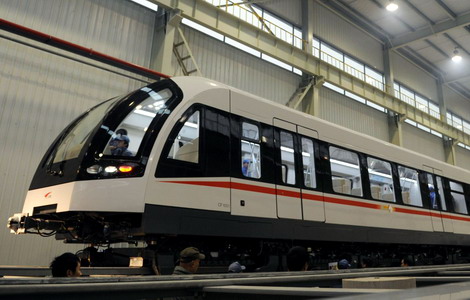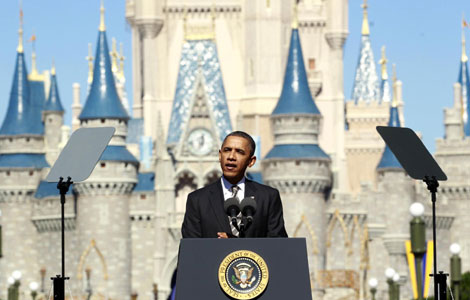China's 2011 fiscal revenue up 24.8%
Updated: 2012-01-20 15:59
(Xinhua)
|
|||||||||
BEIJING - China's Ministry of Finance said Friday that the nation's fiscal revenue grew 24.8 percent year-on-year to hit a record high of 10.37 trillion yuan ($1.64 trillion) in 2011.
Of the total, the central fiscal revenue reached 5.13 trillion yuan, up 20.8 percent from the previous year, while local governments collected 5.24 trillion yuan, up 29.1 percent, the ministry said in a statement on its website.
Tax revenue rose 22.6 percent year-on-year to 8.97 trillion yuan last year, and non-tax revenue surged 41.7 percent to 1.4 trillion yuan, the ministry said.
The ministry attributed the increase to relatively fast economic growth, price hikes, surging corporate income tax and the move to bring non-budgetary funds under its budget management.
Driven by steady economic expansion, business tax revenue rose 22.6 percent year-on-year to 1.37 trillion yuan, and revenue of the value-added tax and consumption tax on imports rose 29.3 percent to 1.36 trillion yuan.
Corporate income tax revenue jumped 30.5 percent from a year earlier to 1.68 trillion yuan, boosted by good economic returns of enterprises.
Fiscal revenues in China include taxes as well as administrative fees and other government income, such as fines and income from state-owned assets.
Foundation for risks prevention
China's fiscal revenue has grown rapidly over the past few years. It took the nation five years to reach 5 trillion yuan in fiscal revenue and four years to double that figure.
Its total fiscal revenue outstrips those of many developed countries, including Britain and Japan.
"The fiscal revenue's rapid growth boldly shows that the country's fiscal risks are controllable, and has laid a solid foundation for the solvency of local government debts," said Bai Jingming, a researcher with the ministry.
Local government debt totaled 10.7 trillion yuan at the end of 2010. Taking into account contingent liabilities for which local governments serve as guarantors, the debt ratio was 70.45 percent, still below the 100-percent alert line, data with the National Audit Office showed.
"The current fiscal status is sound. But the government should be highly alert of debt risks as debt burdens will gradually appear in the future," Bai said.
Premier Wen Jiabao said earlier this month that revenues and spending through local government financing vehicles will be included in the government's budget management while a mechanism will be established to control the gross local government debts through a risk-warning system.
Fast growth challenged
"The country's fiscal revenue scale is impressive, but its ratio in GDP lags behind developed economies," said Su Ming, deputy head of the ministry's Research Institute for Fiscal Science.
On a quarterly basis, the growth of the nation's fiscal revenue slowed last year. It fell to 10 percent in the fourth quarter, compared with 33.1 percent in the first quarter, 29.6 percent in the second quarter and 25.9 percent in the third quarter.
The decrease was caused by an economic slump, personal income tax reform, easing inflation and waning transaction volumes in the country's auto and property sectors, the ministry said.
China's economy expanded by 9.2 percent year-on-year in 2011, with its GDP growth rate dropping to a 10-quarter low of 8.9 percent in the fourth quarter, according to the National Bureau of Statistics.
After the government raised the personal income tax threshold in September, personal income tax revenue fell 5.5 percent year-on-year in the last quarter.
Both auto and property sales slowed amid government tightening measures. Sales of commercial housing rose 4.9 percent to 1.1 billion square meters in 2011, down from 10.6 percent in 2010, while auto sales only rose 2.45 percent year-on-year last year, the slowest growth pace in 13 years.
Xie Xuren, minister of finance, said recently that fiscal revenue growth will slow this year, along with a slowdown in the domestic economy, easing profit gains in enterprises and more structural tax cuts.
Rising spending demand
In 2011, the country's fiscal spending rose 21.2 percent year-on-year to 10.89 trillion yuan, the ministry said.
Central fiscal expenditure reached 5.64 trillion yuan, while local governments, which received 3.99 trillion yuan in tax rebates and transfer payments from the central budget last year, spent 9.24 trillion yuan, it said.
"The country still faces great spending pressure this year," Bai said, adding that more fiscal supports will be needed to promote education, social security and low-income housing construction.
As the country's social welfare level is low, the government has assigned two-third of its fiscal expenditure each year to sectors concerning people's livelihoods.
The ministry said it strengthened its support last year to the education sector, medical and health care, social security, job creation, housing and culture.
The spending aimed at improving public housing conditions increased the most, up 60.8 percent from the previous year to 382.2 billion yuan.
China plans to build 36 million low-income housing units by 2015, of which construction on 10 million units had started by the end of October.
- Foreign job seekers pour into China
- US to quicken travel visas for China
- Iran scientist's killer may use UN info
- Public should set off fewer fireworks
- Crews face test on Italy cruise ship
- Beijing, Tokyo to commemorate ties
- China rolls out new maglev trains
- China's fiscal revenue up 24.8% to 10 trillion yuan
Hot Topics
Kim Jong-il, Mengniu, train crash probe, Vaclav Havel, New Year, coast guard death, Internet security, Mekong River, Strait of Hormuz, economic work conference
Editor's Picks

|

|

|

|

|

|







